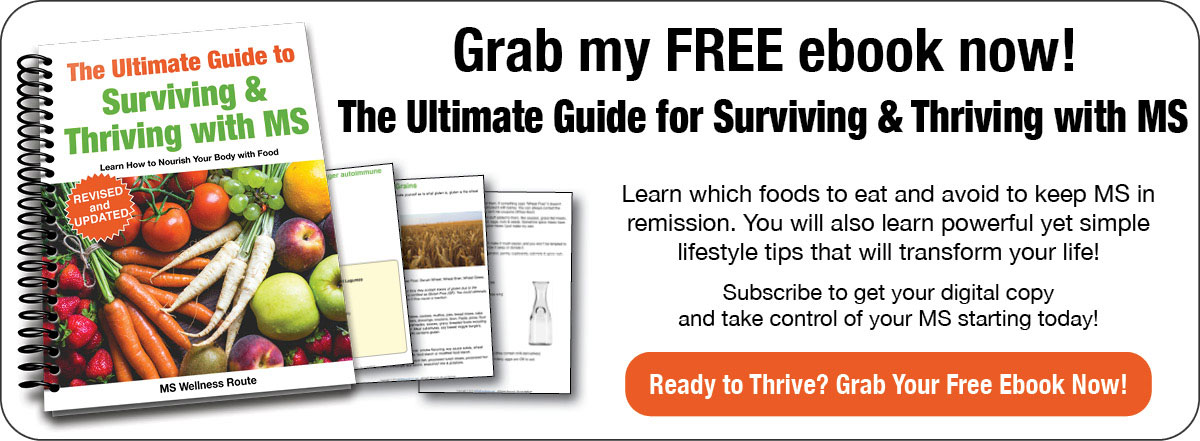Last Updated on November 27, 2023 by Cathy

Being diagnosed with multiple sclerosis (MS) is hard enough. Then your doctor throws a lot of drug options at you. Did your doctor ever mention using food to help manage your MS? Unfortunately, most doctors don’t. My neurologist had the nerve to tell me “Diet doesn’t work.” It’s a good thing I didn’t listen to him. Using food as my medicine is the best decision I made to manage my MS.
“Let food be thy medicine and medicine be thy food.”
– Hippocrates
There are many different diets for MS and I have been on many of them. What I discovered is… not one diet is perfect for everyone. I was able to stop the progression of my MS within the first year of changing my diet. Unfortunately, none of my symptoms reversed.
When The Wahls Protocol book came out in 2014 I decided to give it a try. I figured if Dr. Terry Wahls can go from a wheelchair back to riding her bicycle then I could start walking better. Unfortunately, after strictly following the diet not one symptom reversed.
I still follow the Wahls Protocol because it’s a nutrient-dense diet. But, it wasn’t until I started listening to my body and removed “healthy” foods that my body didn’t like. After three months my heat intolerance disappeared. After suffering for about twenty years from it I couldn’t believe it was gone!
The First Step
The first step to using food as your medicine is to start eating an anti-inflammatory diet. If you’re currently eating the Standard American Diet (SAD) this is going to be a huge change. It will lower the inflammation in your body so it can heal.
Foods to remove:
- Gluten/grains
- Dairy
- Legumes (beans, peanuts, soy, etc.)
- Processed foods
- Refined sugar
- Refined carbohydrates
- Seed oils (canola, safflower, sunflower, vegetable, etc.)
If you’re not sure what an inflammatory diet is, check out: How To Eat An Anti-Inflammatory Diet To Stop MS
Try an Elimination Diet
The next step to healing is to pay attention to how your body reacts to food. It’s a really good idea to start an elimination diet to find any hidden food sensitivities you might have. A food elimination diet is where you remove a certain food item for a minimum of four weeks and then reintroduce it.
If there’s no reaction you can continue to eat it. If your body has a bad reaction you need to remove that food item. This is only temporary until you can get your gut to heal. This is how I discovered I was sensitive to tomatoes and red peppers.

Watch for:
- Bloating
- Brain fog
- Burping
- Diarrhea
- Fatigue
- Gas
- Gut pains
- Headaches
- Insomnia
- Joint pain
- Skin issues (acne, rashes, etc.)
Sometimes your body will have an immediate reaction and other times it can take a few days. Keeping a food diary is the best way to keep track of which foods cause which symptoms.
For me, I get gut pains in about 10-15 minutes after eating eggs. But for tomatoes and peppers, my body doesn’t react until one day later when my face breaks out. – Everybody and every food item are different.
Get a FREE ‘Food Reintroduction Tracker’ at the bottom of this post.
Food Diary
Remove the “healthy” foods that often trigger inflammation. After one or more weeks reintroduce each food item one at a time. Wait a few days before reintroducing another food item.
Foods to remove on an elimination diet:
- Chocolate
- Eggs
- Nightshades (eggplants, tomatoes, peppers, and some herbs)
- Nuts
- Seeds
To track your food/symptoms list everything you eat for the day in a food diary. Include meals, snacks, and drinks then write down if you have any reaction.
Heal Your Gut

People with MS have more bad bacteria in their gut than healthy people. In other words, they are missing the good bacteria. It’s unknown the exact reason but one culprit could be due to having a leaky gut. A leaky gut happens when the tight junctions of the gut lining separate. This allows undigested food particles and toxins to pass into the bloodstream. Diet plays a big role in having a leaky gut.
Along with infections such as Candida overgrowth and chronic stress. It’s important to address any infections otherwise your leaky gut won’t be able to heal. Chronic stress plays a huge role in MS. It’s a trigger to the onset of MS and it can cause a flare.
Possible triggers to MS:
- Diet (processed foods, refined sugar, refined carbs, food allergies, etc.)
- Infections (bacterial overgrowth, parasites, viruses, and yeast overgrowth )
- Environmental Toxins (heavy metals, mold, pesticides, plastics, etc.)
- Chronic Stress (especially emotional stress)
- Hormones (vitamin D, insulin, cortisol, etc.)
- Genetics (you can’t change your genes but you can change your gene expression by living a healthy lifestyle)
It’s impossible to remove all your stress. Learn some techniques to get your stress under control. Like going for a walk, listening to music, meditating, etc. Improving your gut health by nourishing it allows good gut bacteria to flourish and grow. You can do this by eating plenty of probiotic foods such as fermented foods. Plus prebiotic foods that feed the probiotics.
Foods that improve your gut health:
- Asparagus
- Artichokes
- Cabbage
- Coconut yogurt
- Dark chocolate
- Fermented vegetables (carrots, pickles, sauerkraut, etc.)
- Leeks
- Garlic
- Onions
Eat these foods listed above on a daily basis. If you don’t, consider taking a good quality probiotic on a daily basis.
Stay Hydrated

Drinking plenty of water is something that people with MS don’t get enough of. But water is essential for the body. It aids in digestive function, benefits the skin, and helps the detoxification process. It’s best to drink two liters of water each day.
This is tough for people dealing with bladder issues. Try drinking a small amount of water at a time. Avoid drinks that are diuretics such as herbal teas, as they cause you to urinate more often. If you don’t like plain water try adding fruit like berries or cucumbers and herbs like mint.
Quick Links To Information In This Post:
How To Eat An Anti-Inflammatory Diet To Stop MS
What Is The Wahls Protocol?
Tips To Heal Your Leaky Gut
In the End
Giving up certain foods is tough, especially if they are some of your favorites. However, giving up healthy foods that you’re sensitive to is temporary. After you’ve healed your gut reintroduce these foods again. The elimination diet is a temporary diet so you shouldn’t feel deprived. Right now your focus is to do everything you can to stop the progression of your MS. Pay attention to your body so it can heal.
You can do this!

Free Wellness Library!
Subscribe for free and I’ll send you the password to my secret library including the Food Reintroduction Tracker.
Want to remember this health tip? Pin it to your favorite Pinterest board!






